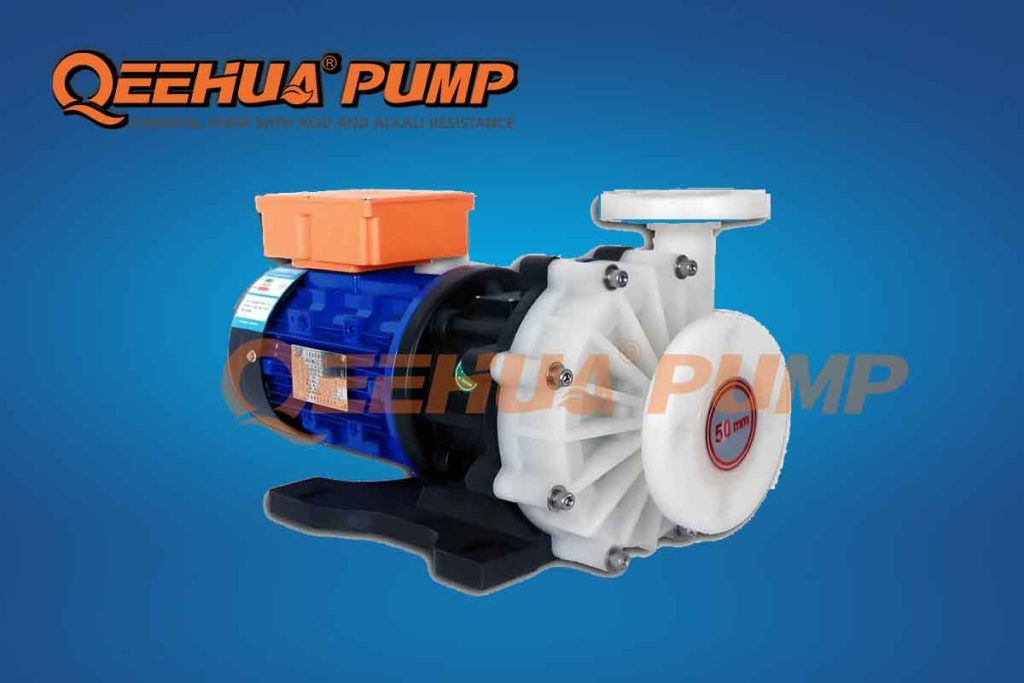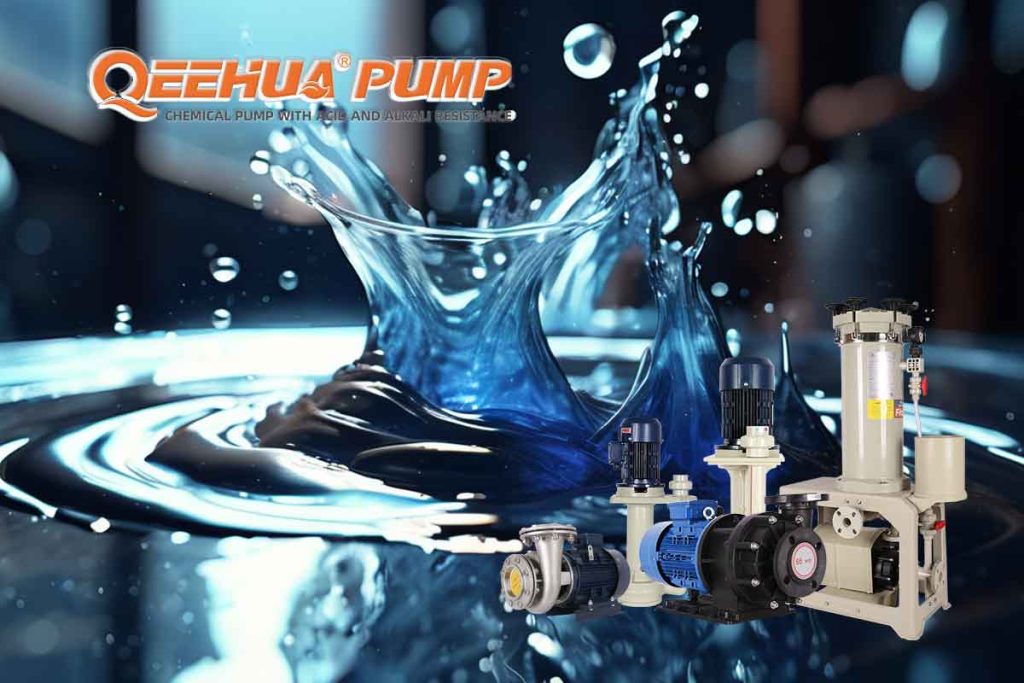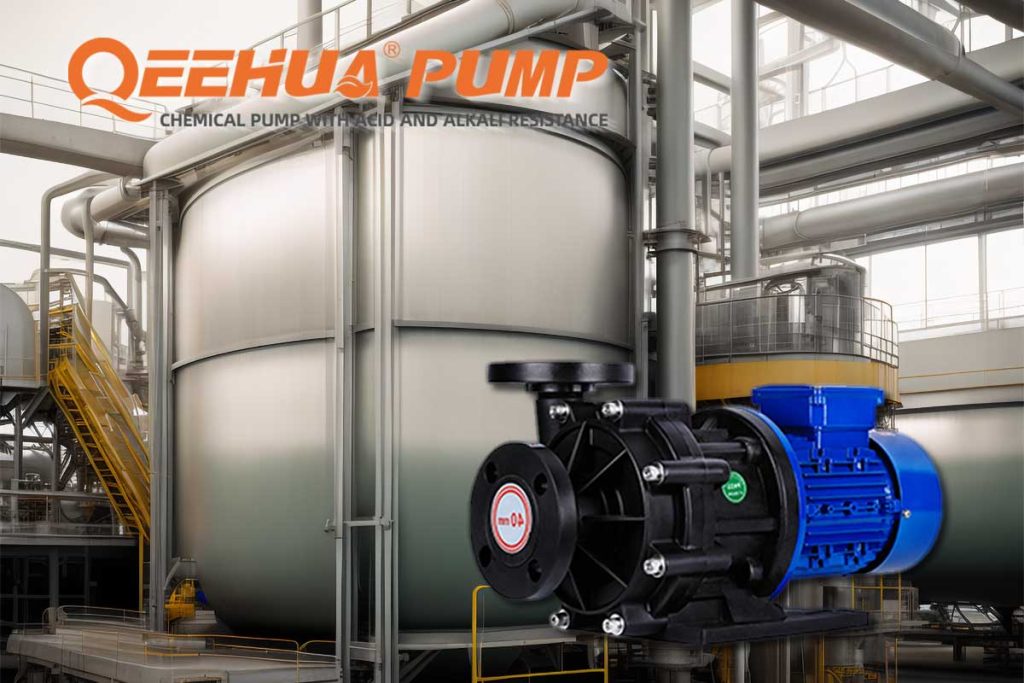Sulfuric acid is an extremely corrosive chemical that can be very dangerous if it comes into direct contact with people. However, sulfuric acid has widespread applications in the chemical industry and is crucial for many industries.
QEEHUA PUMP is a leading and reliable manufacturer of chemical pumps and chemical pump filters, focused on providing efficient, reliable and safe chemical pump solutions for various industries.
Here is a detailed breakdown of the properties, applications and relevant precautions regarding sulfuric acid:
Properties of Sulfuric Acid
Sulfuric acid (H2SO4) is a colorless, odorless, strongly acidic liquid with the following properties:
- Strong acidity: It can react with bases to form salts and water, and is completely dissociated in water into hydrogen (H+) and sulfate (SO42-) ions.
- Reactivity: It can dissolve most metals and is corrosive to many materials.
- Physical state: It is typically provided in liquid form.
Applications of Sulfuric Acid
Sulfuric acid is a crucial chemical produced in the chemical industry, with global annual production of approximately 180 million tons. Its main application areas include:
- Chemical manufacturing: Nearly 50% of global sulfuric acid production is used to make phosphate fertilizers, which plays an essential role in addressing sulfur deficiency issues in agriculture.
- Mining: It is widely used in mining industries to extract different types of metals like zinc or copper from ores or underground deposits.
- Desalination: Used to regulate the pH of seawater, which is a key step in desalination processes.
- Biofuels: Required in the production of biodiesel, requiring corresponding sulfuric acid pumps for transfer.
- Phosphoric acid manufacturing: Indispensable in the manufacture of phosphoric acid, accounting for approximately 80% of global wet production methods.
- Petroleum refining: Used to wash impurities out of petroleum refining products to ensure purity.
- Paper industry: Used to generate chlorine dioxide, a key component in paper and pulp manufacturing and papermaking.
- Sugar bleaching: Used for bleaching processes in sugar production.
Precautions for Sulfuric Acid Transfer
Due to the strong corrosiveness of sulfuric acid to contact materials, the following factors must be considered when selecting a suitable sulfuric acid pump:
- Workplace safety: Prevent employee exposure to sulfuric acid to avoid leaks and toxic fume releases from pumps.
- Chemical pump materials: Select appropriate chemical pump materials based on sulfuric acid concentration, especially noting pipeline system connections and protections.
- Sulfuric acid storage: Understand sulfuric acid’s corrosiveness and select tanks with adequate strength and resistance to oxidation, including secondary containment measures.
- Specialty pumps: Use AODD or magnetic drive pumps for high concentration, temperature and pressure sulfuric acid transfers.
When selecting a sulfuric acid pump, the following factors should be considered:
- Acid concentration: Higher concentration means stronger corrosiveness, so the pump materials and construction must withstand appropriate corrosion.
- Temperature: Sulfuric acid’s boiling point is 337°C, so pumps must withstand relevant temperatures for high temperature transfers.
- Flow rate and head: Select suitable flow rate and head based on specific application requirements.
- Safety: Sulfuric acid pumps must have excellent safety performance to prevent leaks, explosions, etc.
Common Sulfuric Acid Pump Types
Based on pump construction and operating principles, common sulfuric acid pump types include:
- Mechanical seal pumps: The most widely used type. Work by mechanically sealing the impeller from the pump body, preventing leaks. However, mechanical seals wear over long term use, risking leaks.
- Magnetic drive pumps: A sealless pump type where the motor is magnetically coupled to the impeller for leak-free transfer. Excellent corrosion resistance and safety make them ideal for sulfuric acid.
- Diaphragm pumps: Also sealless, using air pressure to drive diaphragms for liquid transfer. Good for low concentration sulfuric acid transfers due to corrosion resistance and safety.
Sulfuric Acid Pump Selection Recommendation
When selecting a sulfuric acid pump, magnetic drive pumps are recommended. QEEHUA PUMP’s magnetic drive pumps use advanced “internal magnet encapsulated injection molding” technology with the following advantages:
- Leak-free: Magnetic coupling eliminates need for mechanical seals, preventing leaks.
- Safe: Simple structures without lubrication mean high safety.
- Corrosion resistance: Manufactured with corrosion-resistant materials for strong resistance.
In summary, carefully choosing the right pump is crucial considering sulfuric acid’s characteristics and industrial applications. Using corrosion-resistant construction materials, magnetic drive technology, top safety features and a trusted manufacturer are key to ensuring sulfuric acid transfer safety and reliability.
As a leading specialized manufacturer, QEEHUA PUMP’s advanced technologies and high-quality products position it at the forefront of the industry. Its “internal magnet encapsulated injection molding” technology solves common industry issues like pump leaks, corrosion, slow heat dissipation, easy cracking, bubbles and damage – providing customers with excellent performance and quality.







